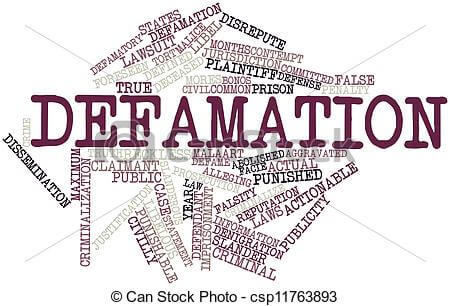Simply put: defamation = lies. And in the online space, there is a whole lot of it.
 Of course, defamation is more complex than just “lies.” Defamation really means an injurious lie; a lie that leads to someone suffering some kind of harm. It is the harm itself that makes the lie actionable, and removes the lie from First Amendment free speech protection.
Of course, defamation is more complex than just “lies.” Defamation really means an injurious lie; a lie that leads to someone suffering some kind of harm. It is the harm itself that makes the lie actionable, and removes the lie from First Amendment free speech protection.
Elements of a Defamation Claim
Defamation, which encompasses both libel (written) and slander (spoken), is a legal claim that allows victims of injurious lies to collect monetary damages in order to compensate them for provable monetary losses. The elements that one must prove to win a defamation action are: (1) that the defendant made a false and defamatory statement concerning the plaintiff and (2) that the defendant made an unprivileged publication to a third party.
Public Figures, Defamation, and the First Amendment’s Right to Free Speech
This gets more complicated when the plaintiff is a public figure: the public figure must show that the defendant acted with “actual malice,” which requires proof of an intent to lie, or at least a reckless disregard for the truth. Because of this extra hurdle, it is very hard for public figures to successfully sue for defamation. And that makes sense—public figures receive the benefits of the spotlight, so the law burdens them with some of that light’s consequences.
However, the true justification lies in the First Amendment’s right of free speech. Defamation law has always butted up against the First Amendment, and the two bodies of law must coexist. Because defamation law enables a censorship of speech, it must do so carefully, so it does not offend the First Amendment’s protection of speech. Because public figures are more discussed, and because, particularly for politicians, that discussion is considered socially valuable, the speech that makes up that discussion is protected more. This results in individual, public figures having a much harder time censoring that speech with a defamation action.
Defamation Law and the Internet: Online Defamation
But defamation law continues to evolve, and with the rise of the Internet, it must do so quickly. While the Internet has led to expansive knowledge dispersion, it has also provided would-be defamers with a perfect platform for dispersing their lies worldwide, with just the click of a button. Internet users can hide behind screen names and user handles, anonymously attacking anyone at any time. Adding another layer of complication is the Communications Decency Act, which makes the websites publishing the defamation immune from suit in almost every situation, so only the individual who defamed can be sued. Many times, that individual cannot be found.
Defamation Attorneys
This has made defamation law—an already complicated body of law—much more complicated. It is important to find a good attorney who knows the law and understands how the law operates in cyberspace. If you have been defamed online, or have been accused of defamation, contact one of our expert Internet Defamation Attorneys at 855-743-8474.




